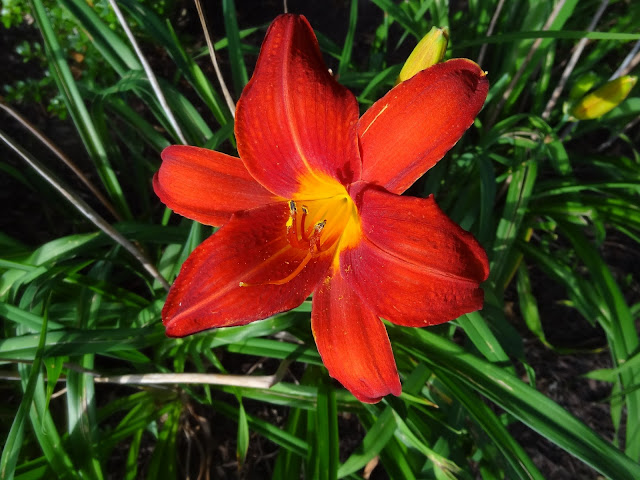Although cats are known to be standoffish, they can be demanding--especially if you aren't doing just what they want. And with the four at my house that usually involves food, petting, and more food.
 |
| Lucky, doing what all cats do--get into bags. |
Two of my cats, Lucky and Lucy, have needed a lot of attention in these areas recently. They are both elderly so when I noticed they were losing weight, I was upset, but not surprised. This had been a pattern in other older cats I had had before and the cause of their problems was failing kidneys. Cats have fragile kidneys which often fail as they get older. When the kidneys aren't filtering well, toxins build up and take away the cat's appetite. Thus, they eat less, and lose weight. You can treat the symptoms of kidney failure, but can't really stop the progression of the disease. Ward and I talked and agreed on how far we were willing to go with treatment before I took them to the vet. We were ready.
Part of our suspicions were confirmed when we found that they had both indeed lost weight. However, followup blood tests showed that both of their kidney functions were good as well as all of the other screening tests that were done. That was a relief, but something was still going on. What? This was uncharted territory for us. Follow up blood work showed that Lucky had hyperthyroidism, meaning his body was burning off more than he was eating. And
many other followup tests showed that Lucy had pancreatitus--meaning her body was not digesting her food enough to absorb it.
Luckily, both of these conditions are treatable IF the cat decides to cooperate. Lucky's treatment is not too bad. It involves putting gel on the inside of his ear flap once a day. He tolerates this well except when he runs away or flattens his ear making it hard to get the medicine inside. However, he is responding to treatment and gaining weight.
 |
| Lucy demanding better food. |
 |
When howling doesn't work,
she tries the pleading eyes. |
Lucy is another story. She has what on paper seems to be a simple treatment. Powder gets sprinkled on her food containing the enzymes she needs to help her digest it. However, Lucy wants nothing to do with this altered food. We have tried multiple foods, both wet and dry, commercial and home cooked. We have also tried feeding her with a little powder and no powder, separately and with the other cats, or just she gets the powder or all of the cats get the powder, We've also tried feeding frequently or not so often as well as giving her B vitamin shots and appetite stimulants. We've tried everything we can think of with very limited results. In the beginning she went for two days without eating anything because of the enzymes. (Not a good thing for an already emaciated cat.) Now, she will eat a few kibble with a very slight dusting of powder in the bowl--sometimes. The vet said that Lucy is acting very typical for a cat and to keep trying. She may give in and slowly adjust. I hope so because I'm getting tired. However, as the vet pointed out, we've only been at this for a week. My how time doesn't fly when you aren't having fun.
I hope Lucy adjusts and we get a lot more time with her. However, if this simple treatment doesn't work, we're in for some difficult decisions ahead. In the meantime, Lucy is begging for more food (she's been here howling three times since I stared writing this) because the last time I fed her, I put enzyme powder on her food. And in her eyes, that's just not acceptable.



















































